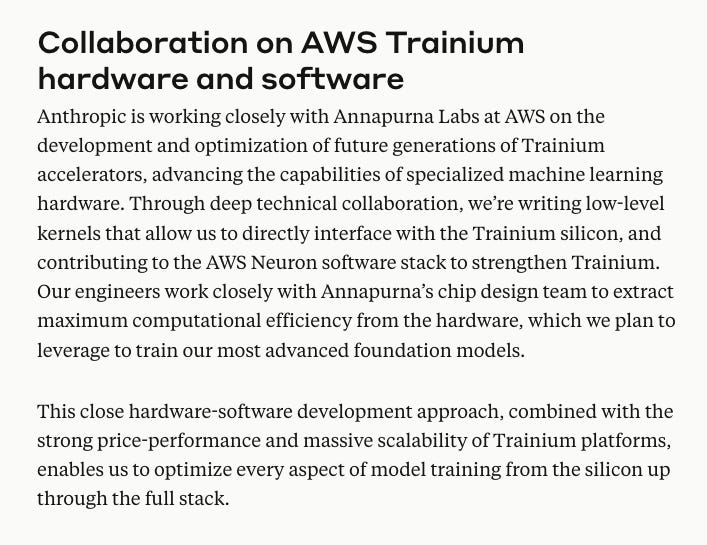Is Chrome divesture a sacrificial lamb or just a government gambit?
Also: Amazon put $4 billion more into Anthropic.
Welcome to Cautious Optimism, a newsletter on tech, business, and power.
📈 Trending Up: Corporate sour grapes … the EV war in China. … Kioxia’s IPO in Japan … the dollar … the Schengen area … stablecoins in the U.K. … fintech IPOs? … bitcoin’s price …
Idiocracy watch: Pam Bondi edition
📉 Trending Down: Stocks in Hong Kong … Hearst … the Post? … Gary Gensler … Modi’s India … climate goals …
The free market: X edition
Google won’t divest Chrome
News that the DoJ may pursue a divestment of Chrome to ameliorate Google’s monopoly in “general search services and general search text ads” dinged the value of Alphabet, its parent company. Shares of Alphabet are off another 1% in pre-market trading this morning.
So far, Alphabet has lost about $120 billion worth of market cap since the news broke, if I am doing my sums correctly.
What does the DoJ want to accomplish in its Proposed Final Judgment (PFJ? Four things, it told the courts and markets this week:
A remedy for Google’s unlawful monopolization must simultaneously (1) unfetter these markets from Google’s exclusionary conduct, (2) pry them open to competition, (3) deny Google the fruits of its statutory violations, and (4) prevent Google from monopolizing these and related markets in the future.
More specifically, Google may be forced to:
stop third-party payments that exclude rivals by advantaging Google and discouraging procompetitive partnerships that would offer entrants access to efficient and effective distribution
And:
disclose data sufficient to level the scale-based playing field it has illegally slanted, including, at the outset, licensing syndicated search results that provide potential competitors a chance to offer greater innovation and more effective competition
And:
reduce Google’s ability to control incentives across the broader ecosystem via ownership and control of products and data complementary to search.
And to divest Chrome, with Android on probation pending Google’s behavior; if Google gets too saucy, it could be forced to divest the mobile OS, too.
What should we make of the list? Y Combinator’s head of policy tweeted that the set of proposed remedies could be worse given the law, while the list of demands gobsmacked some VCs.
Yesterday I caught up with JP Schmetz from Brave, a company that competes with Chrome and Google search. The gist I got from that conversation is that his company will get what it hoped from the set of proposed remedies. (Speaking with him and hearing how Google used its broad product portfolio and huge financial resources to beat back competition validated the government’s view from where I sit.)
But Schmetz also agreed with my riff on TWiST that divesting Chrome feels like a gambit. Back when Microsoft was in the dock for antitrust issues, it managed to stay whole. I’d bet $5 that Google winds up the same, if hobbled by new rules to make it slightly less difficult to compete with.
There are a few reasons why I think Chrome’s proposed divestment is more canard than firm expectation. Primarily, there’s no way for Chrome to pay for itself outside of Google — it’s a search and advertising delivery mechanism that only makes sense as part of a company that does those things. Doubly so now that, as we saw above, Google will probably get blocked from paying for default search status. As an indie company it’s what, a foundation?
Second, I don’t think it’s strictly necessary to meet the government’s goals. Google’s hold on general search and text-based search advertising can be chipped away at with other changes its business practices — and those would not require so much ripping up of internal Google infrastructure.
Third, Google will want a win before it takes its medicine. Why not give it back the thing you were never going to really take away, and get the rest of what you want? Not a bad negotiating technique.
Anthropic + Amazon
Amazon put $4 billion more into Anthropic. That’s a titanic sum and is essentially a blocker bet by the AWS parent company to ensure that it doesn’t lose a march to Microsoft (Azure, OpenAI, its own models) or Alphabet (GCP, Anthropic, Gemini).
But most notable to me is that the power dynamic between the two companies tilted in Amazon’s favor. Amazon wanted Anthropic to use its chips to train its models and run inference. Anthropic was a mostly Nvidia shop, reporting indicates. But here’s the very first headlined section of Anthropic’s funding announcement:
I suppose raising $4 billion is never easy, and as far as concessions go the above is hardly lethal. But the fact that Amazon could make and land the demand indicates that, yes, AI model companies are not above market dynamics. Well, unless they’re OpenAI.
Looking ahead, Pony.AI’s self-driving IPO should happen early next week. Zoom reports earnings on Monday. And we have an international IPO or two to poke at. Thanks for reading CO, I love writing it for you. — Alex




